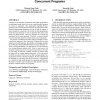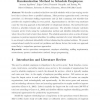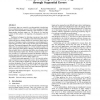50 search results - page 3 / 10 » Producing scheduling that causes concurrent programs to fail |
SIGSOFT
2008
ACM
14 years 6 months ago
2008
ACM
Atomicity is an important specification that enables programmers to understand atomic blocks of code in a multi-threaded program as if they are sequential. This significantly simp...
MEMOCODE
2008
IEEE
14 years 11 hour ago
2008
IEEE
Concurrent programming languages are becoming mandatory with the advent of multi-core processors. Two major concerns in any concurrent program are data races and deadlocks. Each a...
INFOCOM
2010
IEEE
13 years 3 months ago
2010
IEEE
Long-distance multi-hop wireless networks have been used in recent years to provide connectivity to rural areas. The salient features of such networks include TDMA channel access, ...
EOR
2010
13 years 3 months ago
2010
: We describe a method to find low cost shift schedules with a time-varying service level that is always above a specified minimum. Most previous approaches used a two-step procedu...
ASPLOS
2011
ACM
12 years 9 months ago
2011
ACM
Concurrency bugs are caused by non-deterministic interleavings between shared memory accesses. Their effects propagate through data and control dependences until they cause softwa...



